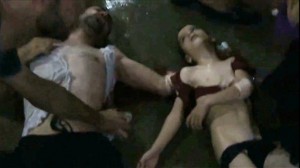
This image from video that was released by a U.S. government official and shown to senators during a classified briefing on Thursday, Sept. 5, 2013, shows people lying helpless on the floor of a facility in Jawbar, Syria, apparently struggling with symptoms of nerve agent exposure. The video was part of a DVD compilation of videos showing victims of the Aug. 21 chemical weapons attack near Damascus. AP FILE PHOTO/APTN
THE HAGUE, Netherlands—The Organization for the Prohibition of Chemical Weapons (OPCW) was thrust into the spotlight when it was required to oversee the destruction of chemical weapons in Syria.
It has been working since the 1990s as the body that implements the Chemical Weapons Convention, the first international treaty to outlaw an entire class of weapons.
What does the treaty do?
The convention prohibits the development, production, acquisition, stockpiling, retention, transfer or use of chemical weapons.
It came into force in 1997 and has been ratified by 189 states. Of those, seven—Albania, India, Iraq, Libya, Russia and the United States, along with a country identified only as “a State Party” but widely believed to be South Korea—have declared stockpiles of chemical weapons. These include mustard gas and nerve agents, like sarin and VX.
Syria is due to become a member state of the organization and has acknowledged having chemical weapons.
Nonsignatories to the treaty include North Korea, Angola, Egypt and South Sudan. Israel and Burma (Myanmar) have signed but have not ratified the convention.
What does the OPCW do?
The OPCW has conducted more than 5,000 inspections in 86 countries. It says 100 percent of the declared chemical weapons stockpiles have been inventoried and verified.
According to its statistics, 57,740 metric tons, or 81.1 percent, of the world’s declared stockpile of chemical agents have been verifiably destroyed. Albania, India and “a third country”—believed to be South Korea—have completed the destruction of their declared stockpiles.
An OPCW report said the United States had destroyed about 90 percent of its stockpile, Russia had destroyed 70 percent and Libya, 51 percent.
Thirteen members have also declared a total of 70 chemical weapons production facilities. The organization says all 70 have been taken out of commission, including 43 destroyed altogether and 21 converted to peaceful purposes.
Who runs the OPCW?
The OPCW is funded by member states and had a budget of some 74 million euros ($100 million, or P4.3 billion) in 2011. It employs some 500 people in The Hague. The director general is Turkish diplomat Ahmet Uzumcu.